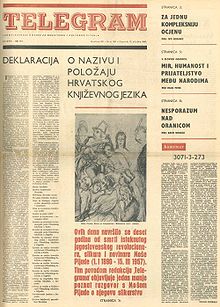Declaration on the designation and status of the Croatian written language

The declaration on the name and status of the Croatian written language ( Croat . Deklaracija o nazivu i položaju hrvatskog književnog jezika ) was directed against a Yugoslav language policy that was perceived as centralized and the associated disadvantage of the Croatian written language compared to the Serbian . So the dominance of the Serbian language over the Croatian, z. B. in legislation , the media , administration, diplomacy and language usage of the Yugoslav Army. It was signed and published in March 1967 by numerous Croatian cultural organizations, including Matica hrvatska and the Croatian PEN Club .
The political leadership of Yugoslavia condemned the Croatian declaration as a “nationalistic aberration”.
prehistory
While the rules for spelling Serbo-Croatian came about more or less tacitly (although the spelling differed in places from the Broz-Boranićev spelling, the "Croatian Duden "), the new spelling was rejected by many Croatian linguists who subsequently drew up the declaration on the name and status of the Croatian written language .
Main demands
The declaration primarily requires:
- to designate the standard variety previously known as the “Croatian variant of the Serbo-Croatian or Croatian-Serbian language” as “Croatian written language” in the future, “as it is the inalienable right of every people to use their own name to designate their language, regardless of whether it is is a philological phenomenon which, in the form of a particular linguistic variant or even in its entirety, also belongs to some other people ”;
- to underline the equality of the Croatian and Serbian standard varieties in the Yugoslav constitution by mentioning "the four written languages Slovenian, Croatian, Serbian and Macedonian" in one breath;
- that only the Croatian standard variety is used in public life in the Croatian republic, "and that officials, teachers and public workers, regardless of where they come from, use the written language of the environment in which they work".
Effects
The Matica Hrvatska said from the 1954 closed agreements of Novi Sad go and began designing a new spell-standard work.
In 1971 the Hrvatski pravopis (Croatian spelling) by Stjepan Babić , Božidar Finka and Milan Moguš appeared , which was banned. The reason for this was that a Croatian and not a Serbo-Croatian language (or Croatian-Serbian ) was deliberately represented. However, one copy made it to London , where the book was reprinted and published. Pregled gramatike hrvatskoga književnog jezika (Overview of the grammar of the Croatian written language), published in 1973, was also banned.
Development after 1971
The Croatian Spring is one of the consequences of this declaration .
In 1974 there were constitutional changes in Yugoslavia as a result of the Croatian Spring. At the end of 1988 the Constitutional Court of Yugoslavia declared these changes to be ineffective, as they believed that the term Croatian language put the Serbs in Croatia at a disadvantage in public life.
On the occasion of the 45th anniversary of the declaration, it appeared again in 2012 in the Croatian weekly newspaper Forum , accompanied by a critical analysis. On the occasion of the 50th anniversary, a new declaration on the common language of Croats, Montenegrins, Serbs and Bosniaks was drawn up in Zagreb in 2017 .
Individual evidence
- ^ A b Srećko Matko Džaja : The Political Reality of Yugoslavism (1918–1991). With special reference to Bosnia-Herzegovina . Munich: Oldenbourg 2002 (Studies on Contemporary Studies in Southeast Europe 37), p. 138 f.
- ↑ SOS ili tek alibi za nasilje nad jezikom . In: Forum . No. 27 , March 16, 2012, ISSN 1848-204X , p. 38–39 (Croatian, bib.irb.hr [accessed on March 16, 2012]).
- ↑ Derk, Denis: Local politicians have created four new languages from the common language . In: Večernji list . March 31, 2017, ISSN 0350-5006 ( vecernji.hr [accessed May 11, 2019] Serbo-Croatian: Lokalni političari iz zajedničkog stvorili četiri nova jezika .). (Archived on WebCite ( Memento from August 18, 2017 on WebCite ))